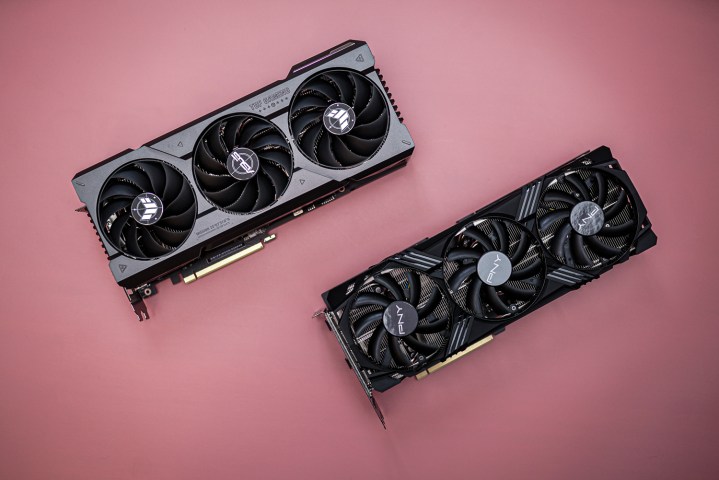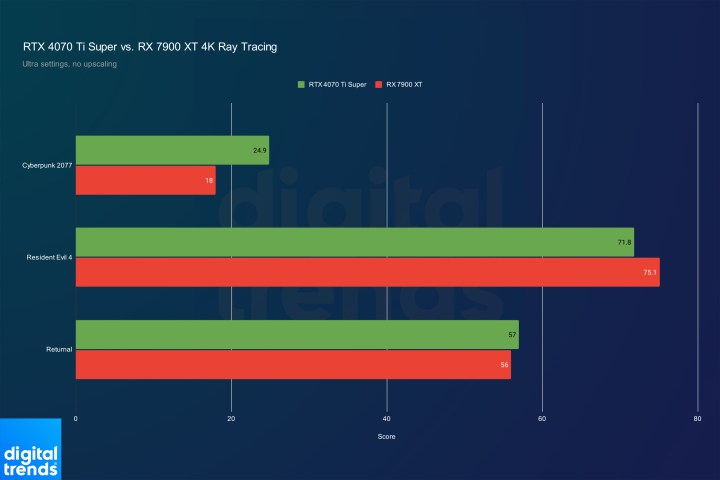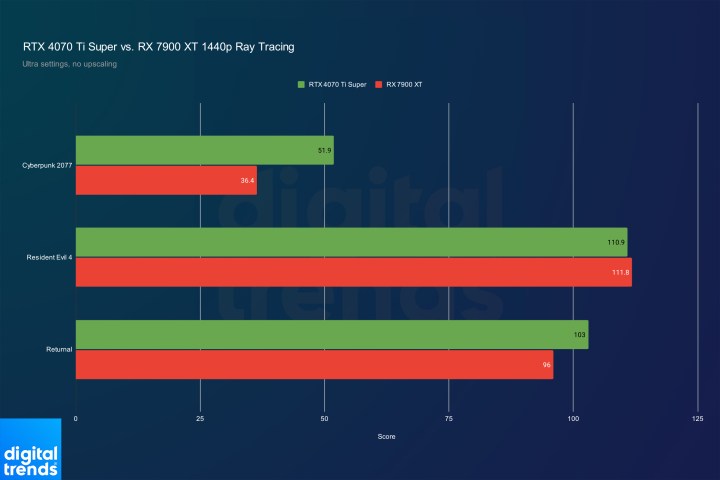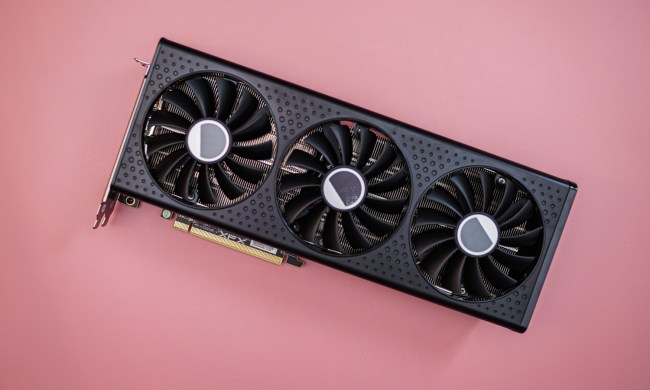
The RTX 4070 Ti Super and RX 7900 XT are unlikely rivals when shopping for the best graphics card in 2024. Price shifting and market repositioning have placed these two GPUs in direct competition, both targeting gamers looking for a premium 4K gaming experience without spending over $1,000.
Both graphics cards hit the mark, offering a smooth frame rate at 4K with all the settings cranked up. The differences between them lie in features and pricing.
I’ve put both cards through their paces to see which is the better buy in 2024. If you want a more extensive look, make sure to read my RTX 4070 Ti Super review and RX 7900 XT review.
Pricing and availability

Normally, the RTX 4070 Ti Super and RX 7900 XT wouldn’t be in the same conversation, but some shifting prices have made these two GPUs directly competitive. The RTX 4070 Ti Super is the newer of the pair, releasing on January 24, 2024, for a list price of $800. The RX 7900 XT is over a year old at this point, releasing in December 2022 for a list price of $900.
AMD’s GPU has taken quite the price tumble since then. You’d have a hard time finding a model above $800 now, and many units sell for far less. At the time of writing, for example, this is available for $730.
The RTX 4070 Ti Super hasn’t seen any price drops, and it likely won’t. The card is replacing the base RTX 4070 Ti, and that GPU held steady at $800 for its full life. Thankfully, models aren’t going above that price. There are overclocked versions that reach up to $850, but I’ve seen models at list price, too, such as this .
Given where prices are now, AMD comes out slightly ahead. Some models reach to $800, but you’ll be able to score an RX 7900 XT between $730 and $750 more often than not.
Specs

As usual, you shouldn’t directly compare the core counts or clock speeds of an AMD or Nvidia GPU. They use different architectures and naming conventions. There are more significant differences elsewhere, anyway, particularly in memory, power, and connectivity.
For memory, AMD is slightly ahead with the RX 7900 XT. It comes with 20GB, while the RTX 4070 Ti Super comes in with 16GB. AMD also leverages a larger 320-bit bus. However, Nvidia uses faster GDDR6X memory, so although it’s behind on overall bandwidth and capacity, it’s not as big of a difference as it looks.
| RTX 4070 Ti Super | RX 7900XT | |
| Cores | 8,448 | 5,376 |
| Interface | PCIe 4.0 x16 | PCIe 4.0 x16 |
| Boost clock | 2.61GHz | 2.39GHz |
| Memory | 16GB GDDR6X | 20GB GDDR6 |
| Memory speed | 21 Gbps | 20 Gbps |
| Memory bus | 256-bit | 320-bit |
| TDP | 285W | 300W |
| List price | $800 | $800 |
In gaming scenarios, you shouldn’t have an issue with either GPU. I have some concerns with VRAM when it comes to weaker GPUs packing 8GB, but at 16GB and 20GB, the RTX 4070 Ti Super and RX 7900 XT are well-equipped to handle the demands of modern games, even at 4K with ray tracing enabled.
Similarly, the two GPUs are close in power demands. Nvidia comes out ahead, requiring 285 watts for the RTX 4070 Ti Super, while the RX 7900 XT pushes up to 300W. Nvidia’s current-gen GPUs are also highly efficient, and the RTX 4070 Ti Super is no exception. It will often run below the power rating when you’re playing games.
AMD has a more decisive lead in connectivity. The RX 7900 XT supports DisplayPort 2.1, allowing you to use a dual 4K monitor like the 2023 Samsung Odyssey Neo G9 with the full resolution and refresh rate. DisplayPort 2.1 isn’t a make-or-break feature right now, but it’s nice to have if you want a GPU that can handle VR applications and stand the test of time as newer displays release.
Performance

Around $800, both the RX 7900 XT and RTX 4070 Ti Super are squarely targeting 4K. You may have to make a few compromises in the most demanding PC games, but there’s an assumption at this price that you’ll be able to play basically any game at 4K and above 60 frames per second (fps). And both GPUs pass that mark.
Overall, the RX 7900 XT is slightly ahead. The margins are small in most cases, but there are a enough small wins here for AMD’s GPU to come out on top in most titles, even if it’s only by a few frames.
At 4K, the RTX 4070 Ti Super only won in a single game: Horizon Zero Dawn. Even then, it only pushed ahead by two frames. Meanwhile, the RX 7900 XT can nearly hit 60 fps in Cyberpunk 2077, while the RTX 4070 Ti Super barely passes the 40 fps mark, and it squarely passes 60 fps in The Last of Us Part One, while the RTX 4070 Ti Super falls a hair short.

The RTX 4070 Ti Super looks a bit better once we step down to 1440p. The dynamic hasn’t changed, though. The RX 7900 XT is ahead in every game except for Horizon Zero Dawn. The differences are just less signficant at this resolution because both GPUs are providing playable frame rates.
Although the RTX 4070 Ti Super has some tricks — I’ll get to those next — the RX 7900 XT is definitely ahead on value. It’s not only faster than the RTX 4070 Ti Super, it also comes in anywhere from $50 to $100 cheaper depending on where you shop for it.
Ray tracing and upscaling

Nvidia traditionally dominates in ray tracing, but the RX 7900 XT and RTX 4070 Ti Super are much closer than I expected. At 4K, the RTX 4070 Ti Super shows a commanding lead in Cyberpunk 2077, but the two GPUs posted identical results in Returnal, and the RX 7900 XT even squeezed out a win in Resident Evil 4.
It’s important to keep the original pricing of these two GPUs in mind when looking at ray tracing. Nvidia would likely have a more dominating lead, but due to the price drops on the RX 7900 XT, it looks far more competitive.

At 1440p, we see similar behavior, though the leads of the RTX 4070 Ti Super are more meaningful. In Cyberpunk 2077, it’s close to 60 fps while the RX 7900 XT just barely passes the 30 fps mark, and in Returnal, the RTX 4070 Ti Super can push up in the triple digits.
Overall, the RTX 4070 Ti Super is better equipped to handle more demanding ray tracing workloads, particularly titles like Alan Wake 2 and Cyberpunk 2077, which offer path tracing. The RX 7900 XT is competitive in those lighter ray tracing games, with Resident Evil 4 and Returnal as prime examples.
Outside of ray tracing, the RX 7900 XT and RTX 4070 Ti Super feature their own upscaling and frame generation tools. Nvidia comes out ahead with its DLSS 3.5, which features not only better quality overall but also Ray Reconstruction for games like Cyberpunk 2077 and Alan Wake 2.
For AMD, it has FSR 3, which includes upscaling and frame generation as well. There are only four games that currently support the feature, however. Thankfully, AMD offers its Fluid Motion Frames through the driver, providing frame generation for any DirectX 11 or DirectX 12 game. It has some big trade-offs compared to DLSS 3.5 but works with just about any title.
Should you buy the RX 7900 XT or RTX 4070 Ti Super?
It’s hard to choose between these two GPUs. If you’re looking to get the most performance for your dollar, it’s hard to argue with the RX 7900 XT. It slightly better performance than the RTX 4070 Ti Super if you look at a broad swath of games, and it comes in anywhere from $50 to $70 cheaper.
Spending up a bit buys you a lot, however. The RTX 4070 Ti Super gets closer to that premium 4K gaming experience, not only with better ray tracing but also the remarkable DLSS 3.5. I’d recommend the RX 7900 XT for most people, but if you don’t mind trading a bit of value to capitalize on those premium gaming experiences every now and again, the RTX 4070 Ti Super is the way to go.



